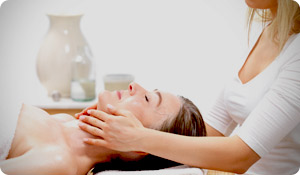
If you're considering a facial rejuvenation procedure, you've likely heard of microdermabrasion, one of the most popular and cost-effective ways to improve your skin's texture and tone. Many doctors and patients rave about how it can shave years off your face; and scientific studies have even proven that it works. But is this non-invasive procedure really as side-effect free as proponents claim?
Unlike dermabrasion, which goes deeper to remove top skin layers and is traditionally used to treat substantial discoloration or scarring, microdermabrasion buffs your epidermis in order to stimulate new skin growth. A doctor or trained technician blasts fine crystals, essentially polishing skin with a diamond wand. The treatment is virtually pain-free and doesn't require any kind of anesthetic or recovery time. Multiple treatments—usually 5-12 administered every 2-3 weeks—are required for maximum benefit. This "lunch-hour" procedure is best used to treat minor age spots, acne scars, and fine lines and wrinkles. People with sensitive skin may choose microdermabrasion over a chemical peel because it can be gentler.
While significant side effects are rare, there are potential risks with any procedure. Typical side effects are usually limited to heightened sun sensitivity during the treatment regimen. Patients need to be diligent about UV protection or they can put themselves at risk for sun damage (effectively negating the point of the procedure as well as increasing their chances of developing a more serious skin problem.) There is also a small chance of inhaling some of the micro-crystals during the treatment, though these are non-toxic so likely harmless. The most significant hazard is a pigmentation imbalance, particularly for people with darker skin tones. People with an even skin tone see the best results.
Since microdermabrasion is not always performed in a doctor's office, patients also need to be sure to let the technician know about any medicines they're taking and any pre-existing conditions. Patients who have recently been on skin medications like Accutane should steer clear of microdermabrasion for several months. People with certain chronic conditions like rosacea and eczema are likely poor candidates for microdermabrasion since it can exacerbate those problems. Treatment should never be performed on skin with severe breakouts or lesions. Anyone who has an existing medical condition, especially an auto-immune problem, diabetes, or lupus, should check with their doctor before considering this type of procedure.
Sources:
The American Society for Aesthetic Plastic Surgery
http://www.surgery.org/media/procedure-facts
Aged Skin May Improve with Aggressive Microdermabrasion
http://www.medwire-news.md/66/84935/Dermatology/Aged_skin_may_improve_with_aggressive_microdermabrasion_.html
American Academy of Dermatology
http://www.aad.org/public/publications/pamphlets/cosmetic_facial.html
Skin Abrasion.net
http://www.skinabrasion.net/side-effects.html





